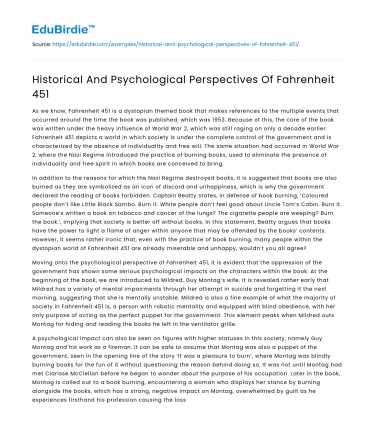As we know, Fahrenheit 451 is a dystopian themed book that makes references to the multiple events that occurred around the time the book was published, which was 1953. Because of this, the core of the book was written under the heavy influence of World War 2, which was still raging on only a decade earlier. Fahrenheit 451 depicts a world in which society is under the complete control of the government and is characterized by the absence of individuality and free will. The same situation had occurred in World War 2, where the Nazi Regime introduced the practice of burning books, used to eliminate the presence of individuality and free spirit in which books are conceived to bring.
In addition to the reasons for which the Nazi Regime destroyed books, it is suggested that books are also burned as they are symbolized as an icon of discord and unhappiness, which is why the government declared the reading of books forbidden. Captain Beatty states, in defense of book burning, ‘Coloured people don’t like Little Black Sambo. Burn it. White people don’t feel good about Uncle Tom’s Cabin. Burn it. Someone’s written a book on tobacco and cancer of the lungs? The cigarette people are weeping? Burn the book.’, implying that society is better off without books. In this statement, Beatty argues that books have the power to light a flame of anger within anyone that may be offended by the books’ contents. However, it seems rather ironic that, even with the practice of book burning, many people within the dystopian world of Fahrenheit 451 are already miserable and unhappy, wouldn’t you all agree?
Save your time!
We can take care of your essay
- Proper editing and formatting
- Free revision, title page, and bibliography
- Flexible prices and money-back guarantee
Moving onto the psychological perspective of Fahrenheit 451, it is evident that the oppression of the government has shown some serious psychological impacts on the characters within the book. At the beginning of the book, we are introduced to Mildred, Guy Montag’s wife. It is revealed rather early that Mildred has a variety of mental impairments through her attempt in suicide and forgetting it the next morning, suggesting that she is mentally unstable. Mildred is also a fine example of what the majority of society in Fahrenheit 451 is, a person with robotic mentality and equipped with blind obedience, with her only purpose of acting as the perfect puppet for the government. This element peaks when Mildred outs Montag for hiding and reading the books he left in the ventilator grille.
A psychological impact can also be seen on figures with higher statuses in this society, namely Guy Montag and his work as a fireman. It can be safe to assume that Montag was also a puppet of the government, seen in the opening line of the story ‘It was a pleasure to burn’, where Montag was blindly burning books for the fun of it without questioning the reason behind doing so. It was not until Montag had met Clarisse McClellan before he began to wonder about the purpose of his occupation. Later in the book, Montag is called out to a book burning, encountering a woman who displays her stance by burning alongside the books, which has a strong, negative impact on Montag, overwhelmed by guilt as he experiences firsthand his profession causing the loss of a human life.
Now, that brings us to the end of our discussion on the different perspectives of Fahrenheit 451. To revise what we talked about just then, Bradbury utilized historical and psychological perspectives to convey a deeper meaning to the story.






 Stuck on your essay?
Stuck on your essay?

